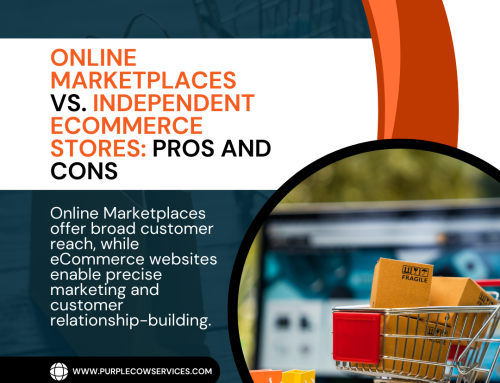In the fast-paced world of eCommerce, staying ahead means embracing the latest trends.
Share This Story, Choose Your Platform!
One such trend that’s been gaining significant traction is sustainable eCommerce practices. As consumers become more eco-conscious, businesses are recognizing the importance of going green not only for the planet but also for their bottom line.
The Rise of Eco-Friendly eCommerce
The eco-conscious movement has seeped into the eCommerce landscape. Consumers today are actively seeking brands that prioritize sustainability. Whether it’s through ethical sourcing, eco-friendly packaging, or carbon-neutral shipping, businesses are taking steps to reduce their environmental footprint.
Sustainable eCommerce isn’t just about following a trend; it’s about making a meaningful commitment to the environment. By adopting eco-friendly practices, businesses can attract a growing customer base that values sustainability.
Eco-Friendly Packaging Solutions
One of the key aspects of sustainable eCommerce is packaging. Traditional packaging can lead to excessive waste, but eco-friendly alternatives are on the rise. Biodegradable materials, minimalist packaging, and reusable options are all becoming popular choices.
By adopting eco-friendly packaging, businesses not only reduce their environmental impact but also show customers that they care about the planet. It’s a win-win situation that can lead to increased customer loyalty.
Reducing Carbon Footprints with Green Shipping
Shipping is a significant contributor to carbon emissions. Sustainable eCommerce practices often involve carbon-neutral shipping options. This means offsetting the emissions generated during shipping by investing in renewable energy projects or reforestation.
Green shipping not only appeals to eco-conscious customers but can also save businesses money in the long run. Efficient shipping practices and reduced emissions can lead to cost savings.
Transparency and Ethical Sourcing
Customers today want to know where their products come from. Sustainable eCommerce practices involve being transparent about the sourcing of products. Ethical sourcing means ensuring that products are made under fair labor conditions and with minimal environmental impact.
Brands that prioritize ethical sourcing build trust with customers and often attract a more loyal following. By showcasing the stories of artisans and the environmental impact of their products, businesses can connect on a deeper level with their audience.
The Impact of Sustainable eCommerce on Branding
Sustainable eCommerce isn’t just about doing good; it’s also about looking good. Brands that commit to sustainability can use it as a powerful branding tool. From eco-friendly logos to green marketing campaigns, businesses are finding creative ways to highlight their commitment to the environment.
This shift in branding not only sets businesses apart from competitors but also helps them connect with a growing segment of eco-conscious consumers. It’s a trend that can elevate a brand’s reputation.
Measuring and Communicating Environmental Impact
To truly embrace sustainable eCommerce, businesses need to measure their environmental impact and communicate it effectively. Tools and software are available to track emissions, monitor energy usage, and assess sustainability efforts.
Communicating these efforts through sustainability reports and transparent communication channels can help customers understand the positive impact of their purchases.
Challenges and Obstacles in Sustainable eCommerce
While the trend toward sustainability is undeniable, it’s not without its challenges. Businesses may face hurdles like higher initial costs for eco-friendly materials and the need to educate customers about the value of sustainable products.
However, these challenges can be overcome with the right strategies and messaging. Sustainable eCommerce requires a commitment to long-term environmental and financial goals.
The Future of Sustainable eCommerce
As more businesses recognize the importance of sustainable eCommerce practices, the trend is expected to continue its upward trajectory. Innovations in green technology, sustainable materials, and eco-friendly logistics will further drive this movement.
Sustainable eCommerce is not just a trend; it’s a fundamental shift in the way businesses operate. It’s a movement that aligns with the values of a new generation of consumers who care deeply about the planet.
Conclusion
In conclusion, sustainable eCommerce practices are no longer optional; they’re essential for businesses looking to thrive in a changing world. By adopting eco-friendly packaging, green shipping solutions, ethical sourcing, and transparent communication, brands can ride the green wave to success.
The growth of sustainable eCommerce is not just a trend—it’s a transformational shift in the way businesses operate and connect with consumers. Those who embrace this change will not only contribute to a healthier planet but also secure their place in a more sustainable future.
With the rise of eco-conscious consumers, sustainable eCommerce practices are no longer just a trend; they’re becoming a vital part of successful business strategies. In this blog post, we’ll delve into the world of sustainable eCommerce and explore why it’s a growing trend that businesses can’t afford to ignore.
Our Purple Cow Services help your business thrive in the eco-conscious era. Embrace sustainable eCommerce to attract eco-friendly consumers and reduce your environmental footprint. From eco-friendly packaging to green shipping and ethical sourcing, we guide you on the path to sustainability. Boost your brand’s reputation, save costs, and secure a spot in the future of eCommerce. Join the green wave with Purple Cow Services today!
Share This Story, Choose Your Platform!
In This Blog:
- The Rise of Eco-Friendly eCommerce
- Eco-Friendly Packaging Solutions
- Reducing Carbon Footprints with Green Shipping
- Transparency and Ethical Sourcing
- The Impact of Sustainable eCommerce on Branding
- Measuring and Communicating Environmental Impact
- Challenges and Obstacles in Sustainable eCommerce
- The Future of Sustainable eCommerce
- Conclusion

















